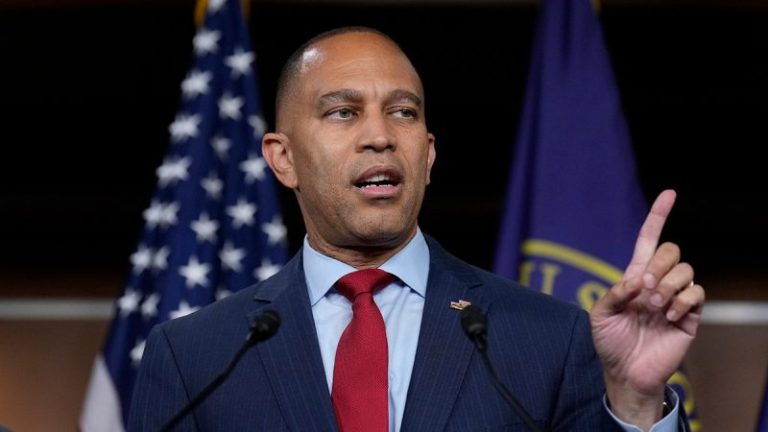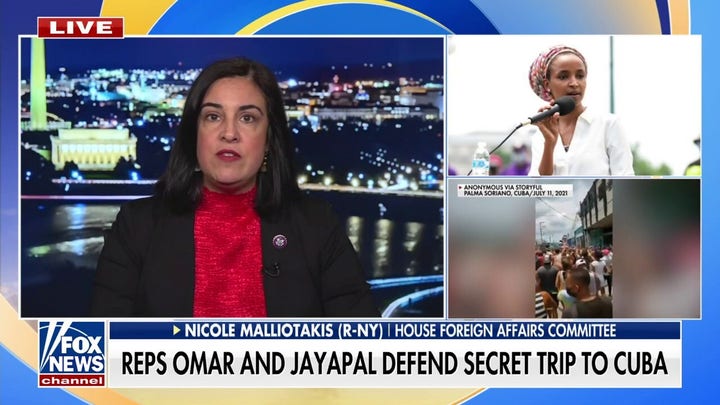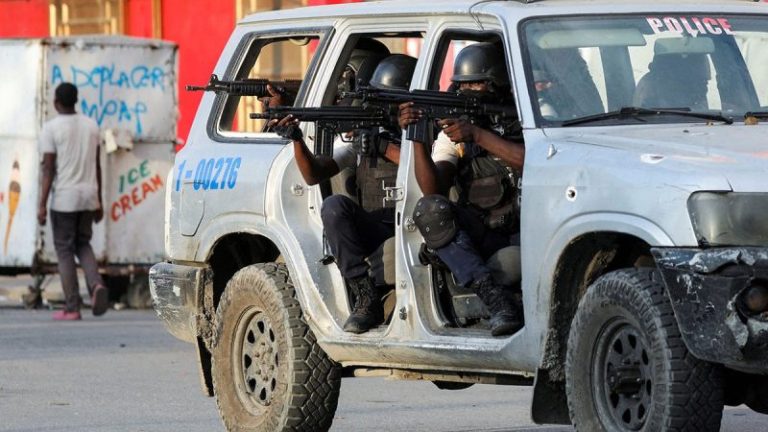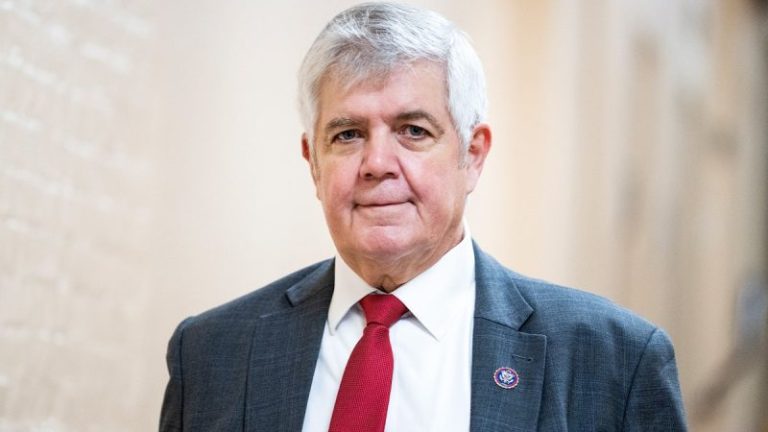Democratic House Minority Leader Hakeem Jeffries, D-N.Y., shared a brief post on social media Thursday evening, criticizing Republicans who are pushing to impeach Homeland Security Secretary Alejandro Mayorkas.
‘Extreme MAGA Republicans are demanding a full impeachment trial in the Senate,’ Jeffries wrote in a post on X. ‘They want to continue the phony political stunt targeting the Homeland Security Secretary.’
He added: ‘My response? Get lost.’
The post comes as the U.S. Senate is going to receive House-passed articles of impeachment against Mayorkas next month.
On Thursday, House Speaker Mike Johnson, R-La., notified Senate Majority Leader Chuck Schumer, D-N.Y., that the House of Representatives would formally send over the impeachment articles to his chamber on April 10.
In his letter to Schumer, Johnson urged him to hold an impeachment trial ‘expeditiously.’
‘As Speaker and impeachment managers of the U.S. House of Representatives, we write to inform you that we will present to you upon the Senate’s return, on April 10, 2024, the duly passed articles of impeachment regarding Department of Homeland Security Secretary Alejandro Mayorkas. We urge you to schedule a trial of the matter expeditiously,’ Johnson wrote.
In February, all but three House Republicans voted to impeach Mayorkas over his handling, or mishandling as Republican content, of the U.S. southern border. It was the first time since 1876 that a cabinet secretary had been impeached.
Schumer‘s office told Fox News Digital that the Senate would initiate the impeachment trial once it receives the impeachment articles.
‘As we have said previously, after the House impeachment managers present the articles of impeachment to the Senate, senators will be sworn in as jurors in the trial the next day. Senate President Pro Tempore Patty Murray will preside.’
The trial is highly unlikely to result in a conviction.
Fox News’ Elizabeth Elkind and Julia Johnson contributed to this report.
Cuba’s repressive Communist dictatorship relies on more than brute force to oppress its people. The Castros and their successors keep Cubans in line by controlling what information they can receive and transmit. That’s why, when demonstrations against shortages of food and other necessities began on March 17, the regime cut the state-provided internet to stop the protesters from coordinating online, and from sharing their videos worldwide.
This Draconian step suggests that the protests have rattled the regime. Cuba’s economic decline is becoming a death spiral. The hardships on the island may now be so acute that its inhabitants are willing to resort to drastic measures.
Given these circumstances, the internet cut-off might effectively hasten the nation’s decline, as it will not only isolate the protesters but all commerce in Cuba – to the regime’s own detriment.
Consider what happened during the 2019 Iranian demonstrations against the removal of government fuel subsidies. During ‘Bloody November,’ the regime in Tehran cut off the state-controlled National Internet Network for three days straight to shut it down. The tactic worked, but at significant cost to the Iranian economy. So, it is not a step to take lightly.
At that time, the United States didn’t have a ready means to restore internet service. Interest in satellite-based internet access emerged in the 1990s, and after some failed attempts, private entities such as SpaceX and Amazon began exploring options around 2014.
After the catastrophic 2017 hurricane season, these efforts gained steam – Google’s Project Loon provided internet access to 100,000 people in Puerto Rico after Hurricane Maria wreaked havoc – but weren’t viable enough to assist the Iranian people two years later.
Now, however, the situation is completely different. SpaceX’s Starlink has famously been providing reliable satellite-based internet access to Ukraine in a war zone for more than two years. Given the contracts SpaceX has with the U.S. Department of Defense, DoD can direct the company to provide the service to partners in distress such as Ukraine. Surely, America would also want to help the people of Cuba marching for their freedom.
Which then begs the question: Why is this direction not coming from the Biden administration?
In Cuba, internet access is exclusively provided by the state-owned Empresa de Telecomunicaciones de Cuba S.A. in partnership with Venezuela. Accessing the internet by any other means is illegal, which means additional actions would need to be taken to provide VPNs and other means to reduce the risk for users to be monitored by the regime.
The millions of cellular subscribers in Cuba can access American service providers, but would require a new subscriber identification module (SIM card) to connect. Starlink access at Punta Gorda Florida could support Cuban users, but terminals would be required on the ground in Cuba, which would be both expensive and complicated logistically.
Providing ubiquitous cellular access will be detectable by Cuba’s oppressive security services so long as they provide access which exposes users with foreign SIM cards to risk, but this would also impose a dilemma on the Cuban government, discouraging them from completely shutting down service. It won’t be easy, but providing this assistance could help the American people finally gain a friend rather than a dangerous foe 90 miles from our shores.
SpaceX’s Starlink has famously been providing reliable satellite-based internet access to Ukraine in a war zone for more than two years. Given the contracts SpaceX has with the U.S. Department of Defense, DoD can direct the company to provide the service to partners in distress such as Ukraine. Surely, America would also want to help the people of Cuba marching for their freedom.
The recent scandal involving accused Cuban spy Manuel Rocha makes this all the more imperative. Rocha, who held sensitive national security positions under the Clinton and Obama administrations, is alleged to have been doing the bidding of Cuba’s communist regime inside the U.S. government for some 40 years.
This reported espionage no doubt contributed to the generational blunder in the 1990s after the fall of the Soviet Union when, instead of ratcheting up economic pressure to hasten Cuban President Fidel Castro’s demise, America stood by as Venezuela President Hugo Chavez offered a lifeline of assistance, creating a new and dangerous axis of communist dictatorship in our own hemisphere.
As Congress is now asserting, we may now have the technological means to make this generational blunder right by standing with the Cuban people and providing them with not just rhetorical support but also the means to avail themselves of free speech and communication if they choose to take their destiny into their own hands.
Robert Greenway is director of Heritage’s Center for National Defense.
A transitional presidential council in Haiti on Wednesday moved one step closer to instating a new prime minister to help stabilize the gang-ridden nation as they wait for Kenyan police forces to arrive.
A months-long plan to send 1,000 police officers to Haiti was stalled in mid-March after Nairobi hit pause on the move following Haitian Prime Minster Ariel Henry’s abrupt resignation in an apparent attempt to end the immense gang violence that had swept the nation.
Kenyan President William Ruto, who faced stiff backlash after he agreed to send forces to Port-au-Prince in a show of ‘strong commitment to Pan-Africanism,’ said the plan would only resume after a new government was reinstated in Haiti.
Many in Haiti are now concerned that additional forces may not be coming to help rein in the gangs.
‘The Haitian police have the capacity to do it,’ one Haitian man told Fox News Digital from Port-au-Prince. ‘The only thing is they have to be more organized, they need more equipment. They need the human resources.’
The man also argued that a strong military force is what is needed to suppress the extreme gang violence directed at not only government agencies but civilian Haitians living in the capital.
‘If they would send 1,000 military guys, I think that would be better because we don’t need police. We need guys that are military,’ he said. ‘Here we’re in a war zone.’
The transitional presidential council on Wednesday released its first statement pledging to restore ‘public and democratic order,’ though it was signed by only eight members of what was originally supposed to be a nine-member council.
‘We are determined to alleviate the suffering of the Haitian people, trapped for too long between bad governance, multifaceted violence and disregard for their perspectives and needs,’ the council said.
The statement also said that once the council is officially installed, it will ‘put Haiti back on the path of democratic legitimacy, stability and dignity.’
Henry has said he will officially resign his post after the transitional presidential council is formally established.
But despite the statement from the council signaling a positive step forward in wrapping up an arduous nomination process, some in Kenya remain skeptical about sending their forces into such a precarious state.
A legal challenge was filed against the deployment of Kenyan police forces by opposition party Thirdway Alliance Kenya last year and the plan has faced several hurdles levied by Kenyans frustrated by Ruto’s agreement.
‘If they come back in body bags, what will [Kenyan President William Ruto] tell the nation?’ opposition leader Ekuru Aukot questioned, according to a report by The Guardian.
The severe uptick in violence this year, a unity agreement established by the gangs and the near complete takeover of the capital city of Port-au-Prince has prompted some in Nairobi to seriously question whether the agreement with Haiti should still stand.
Kenyan authorities have pointed out that since the agreement was first reached in July of last year, there has been a ‘fundamental change in circumstances in Haiti’ and a ‘complete breakdown of law and order.’
Some police officers set for deployment have also begun dropping out following the spike in Port-au-Prince violence earlier this year, according to a BBC interview earlier this month.
Kenya has not yet landed on an official timeline as to when it would deploy its police force to Haiti, even after the establishment of an interim government.
The Associated Press contributed to this report.
House Democrats are pouring money and resources into four congressional seats in a bid to win back the majority as the 2024 election cycle heats up.
The Democratic Congressional Campaign Committee (DCCC), the House Democrats’ campaign arm, announced a new slate of races for its ‘Red to Blue’ program. They’re targeting vulnerable Republican lawmakers in California, New York and New Jersey, as well as an open California seat being vacated by Rep. Katie Porter, D-Calif.
‘I am excited to work with this diverse group of public servants, veterans, and leaders to take the House back in November,’ DCCC Chair Rep. Suzan DelBene, D-Wash., said in a Thursday statement. ‘Their records of service stand in stark contrast to their extreme and dangerous far-right opponents.’
The ‘Red To Blue’ program is dedicated to ensuring its selected candidates ‘receive strategic guidance, staff resources, training, and fundraising support to ensure they are in the best possible position to win in November.’
Democrats’ laser focus on vulnerable GOP seats, including lawmakers who represent districts won by President Biden in 2020, comes as the House Republican majority prepares to grapple with just a one-seat margin of power after multiple early departures.
In California’s 45th Congressional District, Democrats are targeting Rep. Michelle Steel, R-Calif., by bolstering Army veteran and business owner Derek Tran.
‘Tran is equipped to deliver that message to the voters in this diverse Biden +6.8 district with a broad coalition of support, impressive fundraising apparatus, and compelling contrast with the far-right incumbent,’ the DCCC said.
Steel campaign spokesman Lance Trover responded, ‘There’s only one candidate in CA_45 who’s committed to not voting for higher taxes on working families and that’s Michelle Steel – Derek Tran won’t make that commitment to Southern Californians because he supports raising taxes.’
Democrats are also hoping to keep control of Porter’s seat after she announced her departure from the House for an ill-fated Senate bid.
The DCCC is eyeing California state Sen. Dave Min as her replacement, calling him a ‘proven vote-getter and common-sense champion for the middle class.’ He’s running against former California state Assemblyman Scott Baugh, who has been endorsed by GOP leaders.
‘It seems that House Democrats are admitting what we already know,’ Baugh told Fox News Digital. ‘That CA-47 is no longer a blue seat. We will win this seat in November because Dave Min is a radical left-wing legislator who is very out of touch with this district.’
On the East Coast, the DCCC is hoping to flip New Jersey’s 7th Congressional District back to blue after it was won by first-term Republican Rep. Tom Kean Jr. in November 2022, who unseated a Democratic incumbent. To do so, it’s bolstering Sue Altman, a former teacher and former state director of the leftist Working Families Party.
Kean’s campaign told Fox News Digital that Altman ‘is going to cost Democrat stakeholders like the DCCC a lot of campaign dollars trying to run away from her record as head of the Working Families Party in New Jersey where she advocated for insane policies like defunding the police.’
And the Long Island, New York, seat in the 4th Congressional District currently held by first-term Republican Rep. Anthony D’Esposito is also on the DCCC’s list, with Democrats promoting former local official Laura Gillen to flip the district blue.
D’Esposito’s campaign told Fox News Digital, ‘While Congressman D’Esposito continues to put the interests of Nassau County neighbors ahead of partisan politics, perennial candidate Laura Gillen wants to be a rubber stamp vote in favor of Joe Biden’s reckless spending and pro-criminal open borders agenda.’
Referencing past reports about each of the candidates, the National Republican Congressional Committee (NRCC) said of the Democrats’ list, ‘A drunk-driving politician, an ambulance-chasing lawyer, a perennial candidate and a radical progressive activist would make for a great cast on a Bravo reality show.’
‘However, watching them on CSPAN greenlight every liberal pipedream from defunding the police to even more open-border policies would be a nightmare for American families,’ the NRCC said.
A group of 20 House Republicans is urging the Biden administration to roll back protections for the gray wolf, pointing to the species’ growing population size and conflicts with ranchers and farmers.
The GOP coalition, led by Rep. Cliff Bentz, R-Ore., argued in a letter to U.S. Fish and Wildlife Service (FWS) Director Martha Williams that the gray wolf no longer needed to be listed under the Endangered Species Act. He wrote that ‘protection merely for the sake of protection’ is not the purpose of the law. Instead, he encouraged the agency to focus its efforts on protecting species in danger of extinction.
‘The substantial growth in the population of gray wolves throughout Oregon and the western United States poses significant challenges for ranchers, farmers, and outdoorsmen alike,’ Bentz, who chairs the House Natural Resources Committee’s Water, Wildlife, and Fisheries Subcommittee, told Fox News Digital in a statement.
‘It’s imperative that the U.S. Fish and Wildlife Service promptly act to delist the gray wolf so that those in the western United States who are burdened by the reintroduction of an admittedly recovered apex predator species can protect themselves.’
Bentz and his 19 fellow Republicans said the resurgence of the gray wolf population should be touted as a success story of the Endangered Species Act. They argued that removing the federal protections would allow western states to pursue their own protections.
And they emphasized that without a FWS rule delisting the species, the growing population of wolves would create significant, and sometimes life-threatening, conflicts for Americans. Under the Endangered Species Act, killing listed animals can be punishable by heavy fines and even jail time.
‘Unsurprisingly, the substantial growth in gray wolf populations has led to increased conflict between wolves and people,’ the letter reads. ‘The impact of gray wolves on livestock herds is not, and cannot, be limited to just depredation. Wolves inflict much greater damage to herds than can be measured by simply counting carcasses.
‘Wolves have an immense psychological impact on livestock herds that does result in losses for producers. These losses can manifest as ‘stress, sickness, and reduced weight gain and pregnancy rates when wolves scare, chase or attack livestock.’ Too often ranchers are put in the impossible situation of choosing between obeying the law and protecting their livelihoods.’
The letter concluded by stating that ranchers ‘must be able to protect their livestock’ and should not ‘be hamstrung by unnecessary regulations that over-protect a species that is thriving.’
In 2020, the Trump administration agreed that gray wolves had fully recovered and, as such, delisted them as ‘endangered.’ Then-Interior Secretary David Bernhardt said at the time that the species was neither threatened nor endangered, based on the provisions of the Endangered Species Act.
In early 2022, though, a federal district court reinstated the Endangered Species Act protections in the lower 48 states.
And, in a separate but related decision last month, the FWS declined to list the gray wolf in the Northern Rocky Mountains’ ecosystem over objections from environmentalists. Bentz and the other GOP lawmakers said that decision means the species should be delisted across the country.
Calls placed to the FWS were not returned at press time.
The Biden administration insists its support for Israel has not changed since Oct. 7, but Israeli officials and critics argue the decision to abstain from voting against a U.N. cease-fire resolution marks a clear shift in policy.
‘The U.S. did not veto today the new text that calls for a cease-fire without the condition of releasing the abductees,’ Israeli Prime Minister Benjamin Netanyahu’s office said in a statement. ‘This is a clear withdrawal from the U.S.’s consistent position in the Security Council since the beginning of the war.’
Following the vote, White House national security spokesperson John Kirby told reporters that the resolution is nonbinding, with ‘no impact at all on Israel and Israel’s ability to continue to go after Hamas,’ and a clear insistence that ‘it does not represent a change at all in our policy.’
Immediately following the Hamas massacre in Southern Israel, President Biden came out with his full-throated backing of Israel and Netanyahu, stating in no uncertain terms, ‘My administration’s support for Israel’s security is rock solid and unwavering.’
Biden continued to trumpet his full and unmoving support for Israel and any decision the country took regarding a response to the attack. Just days afterward, Biden said, ‘if the United States experienced what Israel is experiencing, our response would be swift, decisive and overwhelming.’
‘As long as the United States stands — and we will stand forever — we will not let you ever be alone… We’ll walk beside you in those dark days, and we’ll walk beside you in the good days to come. And they will come,’ Biden promised during his visit to Israel a week after the attack.
In the following weeks, Biden argued that ‘American leadership is what holds the world together. American alliances are what keep us, America, safe. American values are what make us a partner that other nations want to work with.’ He added, ‘To put all that at risk if we walk away from Ukraine, if we turn our backs on Israel, it’s just not worth it.’
As Israel’s assault on Hamas led to a high number of collateral casualties, President Biden remained firm in his support, seemingly dismissing the early reported numbers that the Gaza Health Ministry published (and some outlets around the world echoed without any caveat) and arguing he could not trust the numbers. The Gaza Health Ministry, as of March, has claimed that over 30,000 people have died in Gaza as a result of Israel’s operation.
‘I have no notion that the Palestinians are telling the truth about how many people are killed,’ Biden said on Oct. 25. ‘I’m sure innocents have been killed, and it’s the price of waging a war.’
Biden late in November praised Israel’s cooperation and ‘commitment’ to an extended pause while Hamas agreed to start releasing hostages — one day for every 10 hostages released.
‘I appreciate the commitment that Prime Minister Netanyahu and his government have made in supporting an extended pause to ensure this deal can be fully carried out and to ensure the provision of additional humanitarian assistance to alleviate the suffering of innocent Palestinian families in Gaza,’ Biden said in November.
The deal only lasted about a week before fighting resumed, with each side claiming the other had broken the terms of the agreement and forced the conflict to resume. Arab nations and some Western allies grew increasingly critical of Israel’s invasion of the Gaza Strip and some nations, such as South Africa and Ireland, started to call Israel’s operation a genocide.
South Africa announced its plan to bring a case before the International Court of Justice, outright and legally accusing Israel of genocide as international opposition to Israel’s actions grew stronger and protests spread even in countries that remained supportive.
In mid-December at a campaign reception, Biden admitted that Israel was ‘starting to lose that support by the indiscriminate bombing that takes place,’ showing the first seeming crack in the previously unconditional support.
Reports around the New Year indicated that Biden’s patience with Israel and Netanyahu had started to wear thin, with reports claiming the two leaders hadn’t spoken directly for nearly three weeks in December while Biden’s patience was ‘running out,’ one official told Axios at the time.
The anti-Israel protests started to chip away at Biden, too, as he saw his approval ratings drop below 40% and he saw sizable ‘uncommitted’ votes in the Democratic Party primaries: Michigan reported 13% uncommitted, topped by Minnesota’s 19% and Hawaii’s 29%. Activists have linked these protests to Biden’s support of Israel and urged voters to keep casting ‘uncommitted’ votes when possible to pressure a cease-fire.
In the run-up to those primaries, Biden said that Israel’s conduct in the Gaza Strip ‘has been over the top,’ leading him to start drawing a line in the sand over Israel’s desire to carry out a major operation in Rafah, regularly touted as the last major city in Gaza where significant numbers of Palestinian people have gathered.
‘The major military operation in Rafah should not proceed without a credible plan for ensuring the safety and support of more than one million people sheltering there,’ Biden said at the White House. ‘They need to be protected.’
The dispute over Rafah and lack of U.S. support caused another seeming rift between Biden and Netanyahu, with the two leaders reportedly going an entire month without directly communicating — even though White House Press Secretary Karine Jean-Pierre and Kirby insisted the president regularly communicated with Israeli officials during that time.
Biden started looking to increase humanitarian aid to Gaza, insisting Israel start to do more to help the Palestinians despite arguments from Israeli officials that such aid ends up going to Hamas, who continue to leech off of the people despite the dire conditions of the territory.
‘In addition to expanding deliveries by land, as I said, we’re going to insist that Israel facilitate more trucks and more routes to get more and more people the help they need. No excuses,’ Biden said on March 1.
The latest rift, which started even before the U.S. abstained from voting on the U.N. Security Council cease-fire resolution, occurred after Biden was caught following his State of the Union address saying, ‘I told Bibi: ‘You and I are going to have a come-to-Jesus meeting.’’
When told he had been caught on a hot-mic moment, Biden said, ‘Good. That’s good.’
Fox News Digital’s Paul Steinhauser contributed to this report.
House Oversight Committee Chairman James Comer, in an unprecedented move, invited President Biden to testify as part of the impeachment inquiry against him, stressing that it is ‘in the best interest of the American people’ for him to answer questions from members of Congress.
Comer urged Biden to accept his invitation in a letter sent Thursday, obtained by Fox News Digital.
‘During the 118th Congress, the House Committee on Oversight and Accountability has been investigating influence peddling conducted by you and your family,’ Comer wrote, noting that the committee has ‘accounted for over $24 million that has flowed from foreign sources to you, your family, and their business associates.’
Comer said the committee has identified ‘no legitimate services to merit such lucrative payments.’
‘You have repeatedly denied playing any role in your family’s business activities, but the Committee has amassed evidence—including bank records and witness testimony—that wholly contradicts your position on these matters,’ Comer wrote.
Comer went on to say that the White House ‘has taken a position hostile to the Committee’s investigation and refuses to release certain information or make available witnesses to testify regarding issues relevant to the ongoing impeachment inquiry currently authorized by the full House of Representatives.’
‘In light of the yawning gap between your public statements and evidence assembled by the Committee, as well as the White House’s obstruction, it is in the best interest of the American people for you to answer questions from Members of Congress directly, and I hereby invite you to do so,’ Comer wrote.
Comer said that the committee is ‘open to accommodating your schedule but proposes April 16, 2024, for the hearing to occur.’
Comer said that the impeachment investigation has moved ‘in phases, beginning with a review of Suspicious Activity Reports (SARs) held by the Treasury Department. Comer said those SARs gave the committee ‘sufficient information to determine which bank accounts to narrowly target in issuing subpoenas.’
Next, Comer said the committee issued subpoenas for bank accounts belonging to Biden family members and their entities that received foreign funds.
‘This phase highlighted the over $15 million received by members of your family, and the Committee has traced tens of thousands of dollars from China to your bank account as well,’ he wrote.
Comer said the next phase was the ‘interview phase,’ explaining that the committee brought in multiple witnesses, including Hunter Biden and the president’s brother, James Biden, for depositions. Comer said those witnesses provided ‘inconsistent testimony regarding your role in your family’s businesses.’
Hunter Biden appeared for his highly anticipated closed-door deposition last month before both the House Oversight and Judiciary committees, where he maintained that his father was never involved in, nor ever benefited from his businesses.
The committee also heard testimony from James Biden, the president’s younger brother, who testified the same.
Hunter Biden did admit, however, that he put his father on speakerphone with his business associates and invited him to drop by his business lunches.
But Comer said two of those witnesses, Tony Bobulinski and Jason Galanis, testified publicly that Biden ‘participated in schemes to provide access to your or others’ offices in exchange for payments to your family.’
Bobulinski worked on a joint-venture with Hunter Biden and a Chinese energy company. Galanis worked with Hunter Biden as well. Galanis is currently serving a 14-year prison sentence related to securities fraud. He has testified as part of the inquiry twice from prison.
‘The public is left with two irreconcilable narratives. The first—asserted by you—is that you did not engage in influence peddling in exchange for payments to your family,’ Comer wrote, adding that the second is that Biden was ‘indeed involved in these pay-for-influence schemes and that you have been repeatedly untruthful regarding a matter relevant to national security and your own fitness to serve as President of the United States.’
Comer went on to detail the ‘body of evidence’ collected through testimony and records, including meetings Biden had with Hunter Biden’s Chinese business partners.
‘You have asserted your family has not made money from China. However, the Committee has identified approximately $10 million originating from China connected to Biden influence peddling. Former business associates of your family have testified that you personally met with multiple individuals from China who have collectively sent millions of dollars to your family,’ Comer wrote. ‘Many of these meetings and business development occurred while you were Vice President or campaigning to be President.’
Comer, in the letter, asked Biden to confirm whether those meetings took place.
Comer also questioned Biden on whether he has spoken to or interacted with executives of Ukrainian natural gas firm Burisma Holdings, including with the chairman, Mykola Zlochevsky.
‘You have asserted that your pressuring Ukraine in 2015 to fire a government official investigating a company in which your son had a financial interest was wholly in line with U.S. policy. The Committee has received bank records showing that your son was paid $1 million per year for his position on the board of the Ukrainian company Burisma until you left public office and then his salary was inexplicably cut in half,’ Comer wrote.
Comer also pressed further for information surrounding the decision to push for the firing of the Ukrainian prosecutor investigating Burisma while Hunter Biden sat on the board.
As for Russia, Comer wrote that witnesses testified that Biden ‘regularly joined meetings by speakerphone, including with certain Russian individuals with whom your son did business.’
‘The Committee has identified several instances in which your involvement aligned with your family receiving money originating from Russia,’ Comer wrote.
Meanwhile, Comer said the committee ‘identified and successfully traced money from foreign transactions—including from China—to your own bank accounts.’ Comer said those checks were described as ‘loan repayments’ from his brother, James Biden.
Comer asked Biden to respond to whether he ever asked his brother about the source of the funds he used to repay him; and asked whether Hunter Biden’s business associate Eric Schwerin, who handled his finances, had insight into all of his bank accounts until December 2017.
‘As the foregoing demonstrates, the Committee has compiled evidence—bank records, contemporaneous electronic communications, and witness testimony—showing your awareness, acquiescence, and participation in self-enrichment schemes of your family members,’ Comer wrote. ‘As Chairman of the Committee, in addition to requesting that you answer the questions posed in this letter, I invite you to participate in a public hearing at which you will be afforded the opportunity to explain, under oath, your involvement with your family’s sources of income and the means it has used to generate it.’
Comer added: ‘As you are aware, presidents before you have provided testimony to congressional committees, including President Ford’s testimony before the Subcommittee on Criminal Justice of the House Judiciary Committee in 1974.’
White House spokesman Ian Sams blasted the impeachment inquiry earlier this month.
‘Comer knows 20+ witnesses have testified that POTUS did nothing wrong. He knows that the hundreds of thousands of pages of records he’s received have refuted his false allegations. This is a sad stunt at the end of a dead impeachment,’ he said.
Sams added: ‘Call it a day, pal.’
Fox News’ Tyler Olson contributed to this report.
Former Secretary of State Hillary Clinton described herself as a victim of election disinformation during a panel discussion on Thursday, and warned that the advancement of artificial intelligence (AI) will make her experience ‘look primitive.’
Clinton was taking part in a Columbia University event titled, ‘AI’s Impact on the 2024 Global Elections.’
She discussed her own experience in 2016 when she lost to former President Donald Trump, pointing out that the internet was populated with memes, fake content and conspiracies about her in the lead-up to Election Day.
‘I don’t think any of us understood it. I did not understand it. I can tell you, my campaign did not understand it. Their, you know, the so-called ‘Dark Web’ was filled with these kinds of memes and stories and videos of all sorts…portraying me in all kinds of… less than flattering ways,’ Clinton said. ‘And we knew something’s going on, but we didn’t understand the full extent of the very clever way in which it was insinuated into social media.’
Clinton argued it was that leap to social media that accelerated the false content’s integration with everyday Americans.
‘There are people today who think I’ve done all these terrible things because they saw it on the internet. And they saw it on the internet in their Facebook feed or some, you know, Twitter this or Snapchat that. They were, you know, following the breadcrumbs,’ she said, warning of those efforts: ‘And what they did to me was primitive.’
The former Democratic presidential nominee claimed the online conspiracies about her are now being used to create more sophisticated false content with more advanced technology.
‘What we’re talking about now is the leap in technology that we’re dealing with. You know, they had all kinds of videos of people looking like me, but weren’t me, and they had to keep whoever that woman was with her back to the camera enough so that they couldn’t actually… be found out,’ Clinton said. ‘Now they can just go ahead, they can take me.
‘I’ve had, you know, people who are students and experts in this tell me… because they’ve got such a library of stuff about me, they’re using it to practice on and see how more sophisticated they can get. So I am worried because, you know, having defamatory videos about you is no fun. I can tell you that. But having them in a way that you really can’t make the distinction… you have no idea whether it’s true or not, that is of a totally different level of threat.’
The potential prevalence of deepfakes — AI-generated videos, audio or images that show altered or completely fabricated scenarios — has already raised concern among U.S. officials ahead of November’s elections.
Those same officials are also concerned about the threat of hostile foreign actors intervening in the 2024 cycle.
FBI Director Christopher Wray warned in a speech last month that AI technology is lowering the barrier to entry for malign actors looking to meddle in U.S. elections.
‘This election cycle, the U.S. will face more adversaries moving at a faster pace and enabled by new technology,’ Wray said.
‘Advances in generative AI, for instance, are lowering the barrier to entry, making it easier for both more and less sophisticated foreign adversaries to engage in malign influence while making foreign influence efforts by players both old and new, more realistic and more difficult to detect.’
LOS ANGELES — The power of love wasn’t enough for Arizona.
Another great regular season ended in disappointment for the second-seeded Wildcats with Sweet 16 exit from the NCAA men’s tournament at the hands of Clemson 77-72 as the program continues to falter in March.
Just like recent seasons, Arizona seemed to have all the qualities of a national championship team. It had its veteran stars back, plus the addition of past Final Four participants Caleb Love and Keshad Johnson. The offense was among the best units in the country. It had the perfect road to the Final Four by practically playing in its second backyard of Southern California.
But another season had another unsatisfactory end.
“We had the ability to get to a Final Four, but we didn’t get it,” Arizona head coach Tommy Lloyd said. “That happens.”
FOLLOW THE MADNESS: NCAA basketball bracket, scores, schedules, teams and more.
Lloyd has done a masterful job in his three seasons at Arizona, making it a national power that’s consistently in the conversation for a No. 1 seed. The 88 wins under Lloyd is the third most in the country since the start of the 2021-22 season, and in the tournament Arizona has been a No. 1 seed once and a No. 2 seed twice.
But in those tournaments, the Wildcats have lost to teams that were significantly lower seeds. In 2022, the No. 1 seed Wildcats lost to No. 5 seed Houston in the Sweet 16. Last season, it was the stunner as a No. 2 seed to No. 15 seed Princeton in the first round. Now this time around, it’s a loss to a No. 6 seed that keeps them out of the regional final. In its last six NCAA Tournament appearances, Arizona has lost to a team seeded at least four spots below them, which is the longest streak in since seeding began in 1979, according to Optastats.
Lloyd will be Arizona’s coach for likely years to come, but the postseason results aren’t sitting well for a fanbase that’s craving tournament success. The Wildcats haven’t advanced to the Elite Eight since 2015, with three of its last five appearance in March Madness ending in the regional semifinal. It hasn’t made the Final Four since 2001, and the team now gets ready to play in what is already a crowded Big 12 next season.
Thursday’s result can’t entirely be pinned on Arizona’s woes; Clemson deserves credit for what it’s done this postseason, crushing New Mexico and shutting down high-powered offenses in Baylor and now Arizona, especially when the crowd inside Crypto.com Arena felt like it was the McKale Center with how many Arizona fans were in attendance. Yet Arizona didn’t help its cause.
Arizona was the third-highest scoring team in Division I. It only managed 72 points Thursday with a major boost from the foul line. It entered the night 10th in the country in shooting. It shot 25-for-67 (37.3%). Arizona was 19th in 3-point shooting percentage. It had its worst night behind the arc this season at 5-for-28 (17.9%). During a 10 minute stretch in the second half, Arizona didn’t make a single field goal with 13-consecutive misses.
It was also a tough night for Pac-12 player of the year Caleb Love. Despite have strong performances in North Carolina to the national title game in 2022, Love struggled to make shots. He was 0-for-9 from 3-point land and was 5-for-18 on the night with 13 points.
Perhaps the most questionable decision making from Thursday night’s loss was the amount of 3-point shots. The Wildcats were ranked 193rd in the country in the 3-point attempts a game, yet it attempted them 28 times Thursday, the second-most tries in a game behind the 35 attempts in the blowout win over Long Beach State in the first round.
Clemson players said it wanted to force contested shots on the night, and it was something they were willing to live with as far as attempts. They sensed the frustration, and knew they were going to keep chucking shots up in hopes of turning the game around.
“We knew their guys like to get up shots,” said Clemson guard Chase Hunter. “A few players are volume scorers. We wanted to make it hard for them. When they don’t make it easy, when you don’t see it going in, your confidence gets down. That’s what we wanted to do to them.”
Despite the struggles on the outside shots, Arizona was having success inside. It outscored Clemson 40-30 in the paint and when driving inside, the Wildcats were getting to the foul line frequently. They had 25 free throw attempts compared to Clemson’s 16, which mostly came in the final minutes of the game.
So why did Arizona keep trying to make 3-pointers?
“We settled for a lot of tough shots,” Lloyd said. “They got it going offensively a little bit and we just never quite did until later in the first half. The second half we made a more concerted effort. We wanted to attack the guys, move the ball, attack, drive closeouts, play with our feet on the ground in the paint. And our guys did a much better job of that in the second half.
“Some of them were good looks and shots we’ve made all season, and today they just didn’t go in,” he said.
Lloyd said even despite the shooting woes, his team deserves credit for being in a position to win. But the credit can only take a team so far. Clemson coach Brad Brownell said what was key in keeping Arizona from generating any solid momentum late in the game was the switch to a zone defense.
“We knew that they were just putting their head down and driving and trying to get fouls, and our frontline was falling apart with fouls,” he said. “We just hoped that we could pack it in a little bit, try to keep them in front of us a little bit more.”
So far, every challenge Brownell and his team have made this tournament have worked. Clemson is now headed to its first Elite Eight appearance since 1980 and only second in team history. Meanwhile, the Wildcats are headed back to Arizona, only it’s not to Glendale to play in the Final Four. It’s back to Tucson with another what-could-have-been ending to a season.
Lloyd isn’t giving up confidence. He believes the foundation built in his tenure will pave off in the future. He said he’s going to take some time to relax before getting to building next season. And just maybe, next season can finally break the Final Four drought.
“Our day in the sun will come,” he said.










